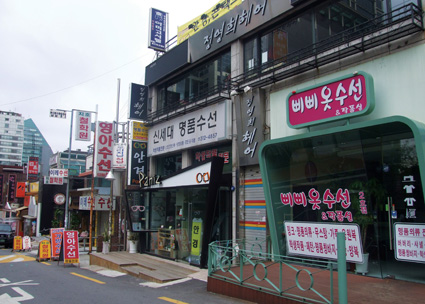
Wall Street may have failed us, but Reform Street and a good half an hour dig in the closet still promise that coveted one-of-a-kind skirt. In the eyes of Yoo Hyun-jong, manager of Reform House, even an umbrella with a bent wire or two is excellent material for a potential dress. The row of repair shops just outside the front gate of
Reform shops started sprouting out in front of Ewha during the mid- 1970s and became widely known for their delicate skills, good taste in contemporary fashion, and creativity. This row of shops came to be known as Reform Street, attracting a wide range of customers and continuous interest from the media. Today, old and forgotten clothes are frantically fished out and hurried to these shops where they become in touch with their inner potential.
As proof of its long and impressive history, the shops also serve as a place of reminiscence for Ewha alumnae. The tailors say some Ewha alumnae just like to come and drop by for a quick chat.
Young Reform Shop, the first reform shop ever to start business in front of Ewha, is a popular stop for old Ewha graduates. “Ewha graduates always comment on how much the place reminds them of their school days when they would reform blue jeans, the ultimate ‘it item’,” said an employee who asked to stay anonymous. “They say it’s like being back in their hometown. These shops are some of the few buildings left standing that have kept their original location and shape to this day.”
But the shops have certainly reformed their services. Ewha graduates would be stunned to find out that today, the shops can reform anything from swimsuits to expensive mink coats. A tear or stain simply disappears. Out-of-fashion items scream Gucci. Pants become a skirt or a dress, or sometimes the other way around.
There are also bizarre cases where a form of old fabric is turned into everyday clothes. “I once had a customer who asked if I could make a dress out of the old placard she had brought along,” said Yoo. “Though stunned at first, our team of fifteen professionals made it happen in the end.”
Though each unique in appearance, the shops of the Reform Street share a common motto. “Every tailor knows that the most important thing is to listen, and match the specific figures and requests of the customers,” said Baek Moon-hui, owner of Jung Alteration Shop. “I just love spinning an old pair of jeans into a fashionable skirt, or watch a piece of reformed clothing fit the customer perfectly. We work towards making our pieces one-of-a-kind.”
Customers say they are happy with the results. “I took a trip to Reform Street when I heard the reform shops there are the best in the city,” said Pyo Sun-ji (Dongduk Women’s University, 3), who has visited Reform Street three times. “I have had two pairs of jeans turned into skirts, two old bell-bottom pants into straight ones, and a pair of baggy pants into shorts.” Most of them were outdated designer jeans stuck in her closet. “My sister is also a huge fan.”
Yoo and Baek say their customers are still mostly Ewha students. For many decades, they have taken on almost everything, from class projects to everyday clothes. “Some may think Ewha students decorate themselves with luxury brands from head to toe. But that is merely a bad stereotype ? I have never met anyone as economical as Ewha students.” said Yoo. “They do not carelessly throw away old things, but bring them here to change them into something new. They also never forget to give me a big thumbs-up when I’m finished with their clothes.”

